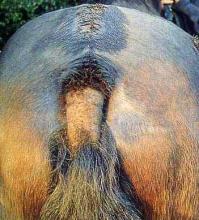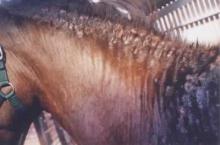Sweet itch is an allergic skin condition which is frequently encountered in the UK horse population. It commonly affects British native pony breeds, heavy horses and other European native breeds (e.g. Haflinger, Icelandic, Friesian and Fjords), but can affect any horse or pony. As many as 1 in 20 horses may be affected and there is no known cure.
The disease is caused by hypersensitivity to the bites of the Cullicoides midge which produces skin irritation. Affected horses will scratch, rub and bite at the affected areas causing significant damage to their skin. Unfortunately this sets off a vicious cycle, where the more the horse rubs the itchier he becomes. The key to managing the disease is to try and break this cycle.
What are the signs of the condition?
Sweet itch usually affects the mane, tail and face but can affect the whole body in severe cases. The disease tends to start in young adulthood and can become worse with every season. It is usually diagnosed on the clinical signs and by ruling out other itchy skin diseases such as parasites or other allergies. Intradermal skin testing or skin biopsies may be useful in some cases.
Affected horses often have broken hair, hair loss, thickened crusty and weeping skin on the affected areas. They may appear very itchy or sensitive to touch. It can be difficult to tell whether a horse suffers from sweet itch in the middle of winter, but close examination may reveal thickened skin and skin folds in the roots of the mane.
How is sweet itch treated?
1. PREVENTING IRRITATION - the most important
- The key to managing sweet itch is to try and avoid the horse or pony becoming bitten by the midges. The midge season can last from March until November, so looking after a pony that suffers from sweet itch can be challenging.
- Avoiding turnout at dawn and dusk is essential.
- If possible, avoid using paddocks near lots of trees, manure, rotting vegetation or standing water where midges can breed.
- Keeping the horse or pony rugged from early in the season will help reduce midge bites. There are lots of good ‘onesies’ available that cover everything from muzzle to tail, and it is often worthwhile have a spare to change with so they can be kept clean and in good repair.
- Barrier creams and oils (e.g. Vaseline) can be applied to make it more difficult for midges to bite but should not be applied to broken skin. These can be useful on areas not protected by rugs eg sheath/udder.
- Pour on insecticides (e.g. Switch) are also useful in killing midges as they feed, (again should not be applied directly to broken skin). Fly repellents (especially those containing DEET) should be applied frequently and long acting tags and strips fitted to rugs may be helpful.
- Some owners install fans in stables which stop midges being able to land on the horse. Netting can be effective in keeping flies out, but must be fine enough to stop midges if used.
2. REDUCE HYPERSENSITIVITY
- Steroids are potent anti-inflammatories. They can be used topically on skin (can difficult when treating large areas). Steroids can be very effective but do have side effects and the horse must be carefully monitored by a vet to ensure the dose is appropriate.
- Cavalesse® is an in feed supplement containing nicotinamide that balances the horse’s immune reaction to midge bites. It can be a useful addition to standard treatments if started before the midge season has begun.
- Desensitisation with Immunotherapy is now readily available for equine patients and can be useful in some individuals along with preventative management.
- Regular bathing with gentle shampoo reduces the build up of inflammatory debris on the horse’s skin.
3. PREVENTING SCRATCHING
- Using electric fencing to discourage scratching on fences and gates will reduce skin trauma, but should only be used alongside other good management practices
There is likely a genetic predisposition to sweet itch, so affected animals should not be used for breeding. Much research is currently ongoing to improve our management of sweet itch. At St Boniface Vets we will keep you updated with the latest treatment options as they become available. However ,for horses and ponies affected by sweet itch, owner commitment to preventative measures early on in the season, and then keeping treatment going throughout the summer, is key.



